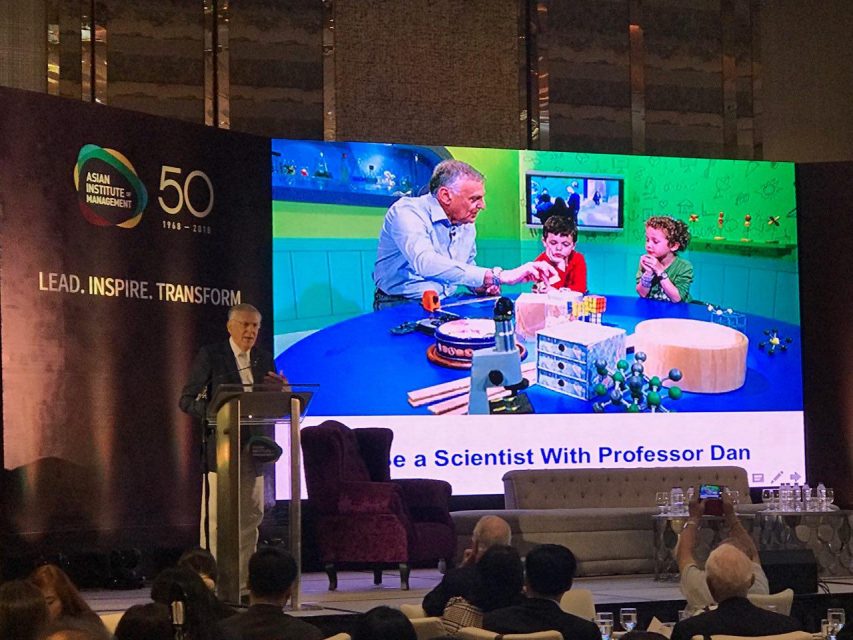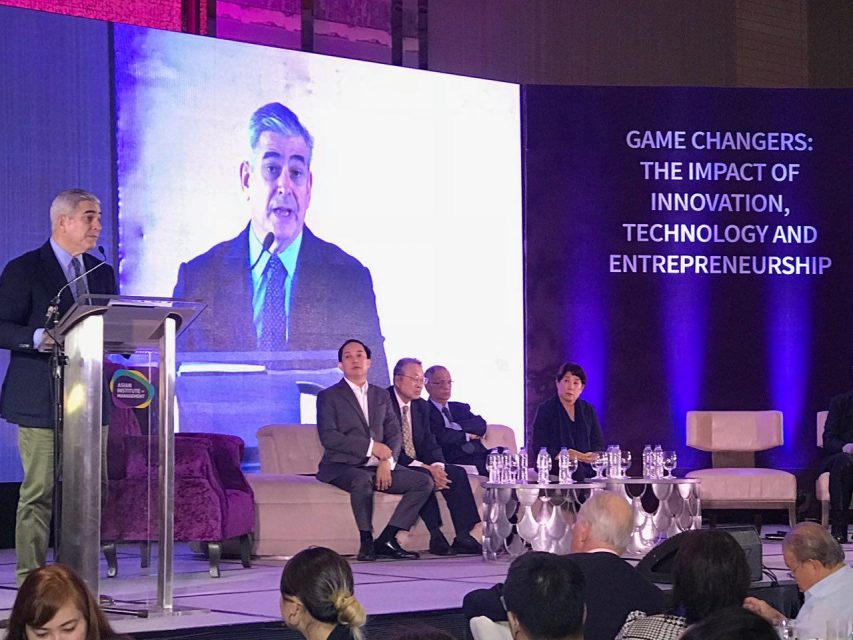
By Caesar Vallejos
Eagle News Service
Nobel Laureate, Prof. Dan Shechtman and notable business and government leaders shared their experience and expertise in a forum entitled “Game Changers: The Impact of Innovation, Technology and Entrepreneurship” that was held at the Shangri-La at The Fort, caping off the 50th anniversary celebrations of the Asian Institute of Management (AIM).
In his talk, Prof. Shechtman, recipient of the 2011 Nobel Prize in Chemistry, emphasized the need to establish new technology ventures. He is globally recognized as a pre-eminent advocate of technological entrepreneurship.
“Hi-tech startups develop relatively fast and hire many more new employees, relative to their size, than large corporations,” he said.
“Building sustainable economy requires development of human ingenuity. Human ingenuity is the most sustainable natural resource,” the Nobel Laureate said. He is also a Materials Science Professor at the Technion-Israel Institute of Technology and at the Iowa State University.
He emphasized the following factors for game-changing initiatives to prosper: good basic education to all; good engineering and science education; government policy and support; free market economy; and no corruption.
“But that may not be enough, also needed is development of entrepreneurial spirit and knowledge and entrepreneurial ecosystem,” he said.
Prof. Shechtman is among the early believers that a scientist can and should turn their discoveries into viable business enterprise. He designed the first Technological Entrepreneurship course after he observed a glaring gap – while Technion prepared their graduates to be hired for big business, it offered little training for scientists who wanted to go into business for themselves.
“It is a large class and today, more than 10,000 Technion graduates, all engineers and scientists took my class,” he said.
The Nobel Laureate also tacked cultural considerations during the forum. “Many places in the world see failure as a shame, and therefore people will not take risks. So we have to overcome these obstacles. Failure is okay but you need to start again. And as you start again, you are now an experienced entrepreneur, and the next time you will try, you will not fail,” he said.
“New opportunities will be available for the educated. The new great new world belongs to the educated,” he stressed.
He also emphasized that education must start at a very early age particularly science education. He showcased Israel’s special kindergarden dedicated to science where kids perform experiments in a lab set-up. “This is a success, and I encourage countries coping to develop [the same].” One of his projects is to teach science to young children on television.
Inclusive innovation
The panel reactors at the Forum included Ayala Corporation Chairman and CEO Jaime Augusto Zobel de Ayala (JAZA). He said “ beyond innovations that involve technological and behavioral trends, it is also essential that businesses should look at the structure in society. I think entrepreneurship and innovation should look into bridging societal gaps.”

He shared a study on the average lifespan of the top 500 US companies that has fallen quite dramatically over the years, from 61 years in 1958 to 18 years in 2012.
“The lifespan of large institutions is shrinking overtime because of innovation and entrepreneurship. If that’s not a wake-up call for large institutions like ours, I don’t know what is,” JAZA said.
“What brought you success once upon a time will no longer bring you success in the future,” he added.
Conglomerates, he said, can “harness capacities to likewise accelerate progress in the communities that they serve and be social catalyst and not just a technology catalyst.”
He cited Dr. Raul Familla who noted “that large enterprises do have competence and capital to boost the nation’s ability to deliver crucial public goods and promote welfare most especially when government resources are limited in certain sectors.”
“We see that trend in emerging markets, generally. Funding and capital for infrastructure needs of the country in the past two decades have been the major initiatives of those with large balance sheets,” he said.
In addition, multi business groups function as catalyst for entrepreneurial activity in a large scale. “Sometimes, these are underappreciated how much activities take place within the structure of large institutions.
“There are ecosystems that exist within large institutions and this example show that multi business groups do have a significant capacity to create strong economic activity, if directed correctly and consequently, grassroots grow through their broad ecosystem,” he said.
However, the Ayala CEO mentioned that in recent years, “we felt that we need to take a much more systematic approach to encourage innovation across our established businesses rather than have remain static and unfortunately in many cases, move them to irrelevance.” To address this, his group established the Ayala Innovation, a think tank for excellence that coordinates innovation teams.
JAZA mentioned, “it’s not just about technology, products and services, we are trying to create a positive influence in the inequalities that began to take place in the society. Innovation should improve business efficiency or to increase the affordability of essential products and services to serve a broader population.”
“This is where inclusive innovation comes to life – it is about seeing potential in offering more to what are seemingly unattractive spaces and find imaginative, meaningful ways to create value,” he ended.
The other panel reactors included Hon. Fortunato dela Pena (Department of Science and Technology), Doris Magsaysay-Ho (Magsaysay Group of Companies), Stan Chi (Acer Computers), Narayana Murthy (Infosys) and Prof. Chris Monterola (AIM-SITE).








